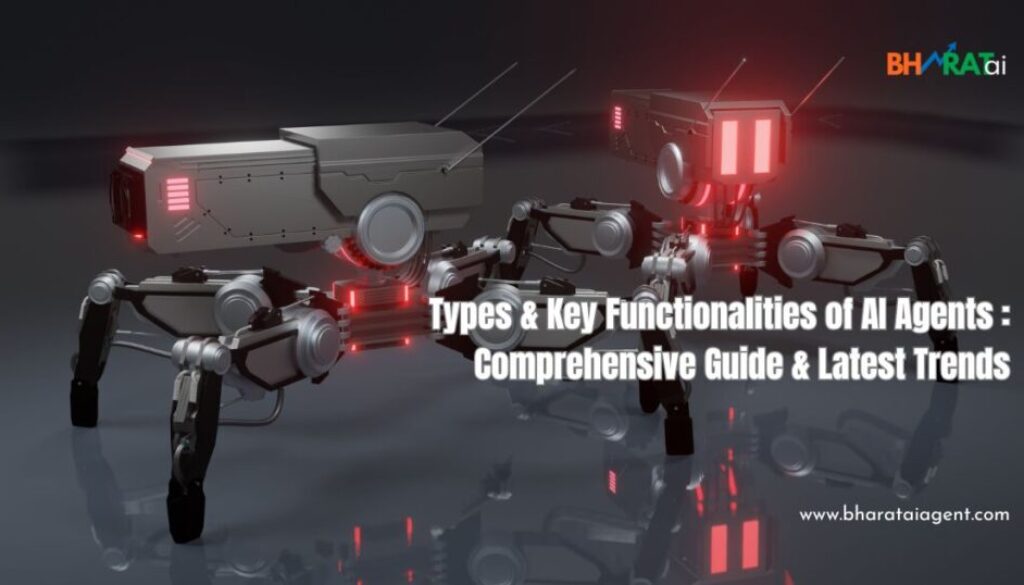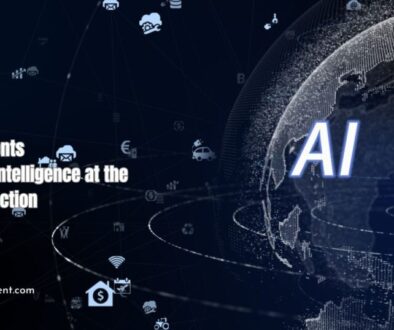Types & Key Functionalities of AI Agents in 2025: Comprehensive Guide & Latest Trends
Introduction
AI agents have become integral in streamlining tasks, automating complex workflows, and transforming how businesses and individuals interact digitally. These intelligent systems autonomously perform specific roles, enhancing efficiency, personalization, and productivity across numerous applications.
In this complete, AI-friendly guide, you’ll learn:
-
What exactly are AI agents?
-
Types of AI agents in use today
-
Key functionalities and practical examples
-
Latest developments in AI agents (March 2025)
-
Real-world industry applications
-
Benefits & limitations
-
Future trends and predictions
-
Clear answers to common FAQs
What Are AI Agents?
AI Agents are sophisticated software systems powered by Artificial Intelligence (AI), designed to perform tasks autonomously. Leveraging advanced machine learning, natural language processing (NLP), and deep learning algorithms, these agents independently handle tasks such as communication, data analysis, workflow management, and creative content generation without continuous human oversight.
Types of AI Agents in 2025
AI Agents can be broadly categorized based on their core functionalities:
✅ 1. Conversational AI Agents
Conversational agents communicate naturally with users through voice or text, providing assistance and answering questions instantly.
-
Examples: GPT-4 Turbo-powered chatbots, virtual assistants like Siri, Alexa, and Google Assistant.
✅ 2. Personal Productivity AI Agents
These agents manage personal and professional tasks such as emails, scheduling, meeting coordination, and productivity enhancements.
-
Examples: Personal AI agents integrated with productivity tools like Notion, Slack, WhatsApp, Telegram.
✅ 3. Generative AI Agents
Specialized AI systems that autonomously produce original content like articles, images, videos, and scripts.
-
Examples: Content-generation agents (GPT-4 Turbo, Gemini 1.5), image/video creators (Midjourney, Runway AI).
✅ 4. Sales & Marketing AI Agents
AI-driven systems focused on lead generation, outreach automation, and hyper-personalized marketing campaigns.
-
Examples: Automated LinkedIn and email outreach agents, CRM-integrated sales assistants.
✅ 5. Operational & Workflow AI Agents
Intelligent agents that manage, optimize, and automate business processes, from inventory management to logistics and customer service.
-
Examples: Supply-chain management agents, automated CRM response systems, AI-powered ERP solutions.
✅ 6. Emotionally Intelligent AI Agents
These agents recognize and respond empathetically to human emotions, enhancing user experiences.
-
Examples: Customer service agents that detect user sentiment, mental health support chatbots, HR virtual assistants.
Key Functionalities & Practical Examples
Here’s how various AI agents function in practical scenarios:
🎯 Conversational Support & Service
-
Functionality: 24/7 multilingual customer interactions, automated responses, and problem resolution.
-
Example: Airline chatbots that handle ticket bookings, rescheduling, and inquiries instantly.
📆 Personal Scheduling & Productivity
-
Functionality: Automate meeting scheduling, email management, task reminders, and workload optimization.
-
Example: AI agents integrated with calendars (e.g., Google Calendar) autonomously arranging meetings and follow-ups.
🎨 Generative Content Creation
-
Functionality: Autonomously generate articles, social media posts, visual media, and video scripts.
-
Example: Marketing teams using generative AI for social media content creation (Midjourney Video, GPT-4 Turbo).
🚀 Sales Automation & Lead Generation
-
Functionality: Autonomous outreach, personalized messaging, and lead qualification.
-
Example: LinkedIn automation agents identifying prospects, generating personalized messages, and managing outreach campaigns.
🛠️ Workflow Management & Automation
-
Functionality: Manage end-to-end business processes including inventory control, customer data management, and financial transactions.
-
Example: ERP-integrated AI agents optimizing supply chain and inventory management autonomously.
💬 Emotion Recognition & Response
-
Functionality: Detect human sentiment in conversations and respond with empathy and personalization.
-
Example: Mental health apps providing real-time, empathetic AI-driven conversations and support.
Latest Developments in AI Agents (2025)
Recent innovations include:
-
Advanced Multimodal Capabilities: Agents simultaneously processing text, images, video, and audio, delivering richer and context-aware interactions.
-
Proactive AI Interactions: Agents that autonomously anticipate and perform actions based on user behavior and context.
-
Agentic AI Research Automation: Intelligent agents autonomously gathering, summarizing, and presenting comprehensive research information from multiple digital platforms.
-
Edge-Based AI Agents: Lightweight, privacy-focused AI operating directly on smartphones, IoT devices, and wearables for faster performance.
-
Quantum-Enhanced AI Agents: Early adoption of quantum computing to dramatically boost processing speeds and handle complex, real-time tasks efficiently.
Real-World Industry Applications of AI Agents
AI agents significantly impact diverse sectors, including:
-
Healthcare: Patient communication, diagnostics, personalized medicine.
-
Finance: Fraud detection, automated trading, financial advisory.
-
Retail & E-commerce: Real-time inventory and personalized marketing.
-
Education: Personalized learning experiences, automated assessments.
-
Logistics: Supply-chain optimization and real-time tracking.
-
Entertainment: Generative AI-driven media content creation.
Benefits of AI Agents in 2025
Businesses and individuals benefit significantly from AI Agents:
-
Efficiency & Automation: Significant reduction in manual workload.
-
Improved Decision-Making: Real-time, data-driven insights.
-
Cost Reduction: Lower operational expenses via automation.
-
Enhanced User Experiences: Highly personalized, immediate interactions.
-
Innovation & Scalability: Rapid development of new, scalable solutions.
Challenges & Limitations of AI Agents
AI agents also pose challenges:
-
Privacy & Security Concerns: Responsible management of user data.
-
Algorithmic Bias: Ensuring fairness in AI decision-making.
-
Dependence on Data Quality: Need for continuous, accurate data input.
-
Transparency & Explainability: Ensuring clear understanding of agent decisions.
Future Trends & Predictions for AI Agents
Experts predict these emerging trends for AI Agents:
-
Widespread Multimodal AI Integration: Seamless processing across multiple data types.
-
Autonomous Metaverse Agents: Virtual agents enhancing immersive virtual experiences.
-
Quantum-Powered AI Agents: Quantum computing integration boosting agent capabilities.
-
Highly Personalized AI Experiences: Real-time, proactive interactions tailored uniquely to each user.
FAQs: Types & Functionalities of AI Agents
Q1: What exactly are AI Agents?
AI Agents are intelligent software systems capable of independently performing tasks, managing interactions, and making informed decisions using advanced AI techniques.
Q2: How are AI Agents categorized?
Common categories include Conversational AI, Generative AI, Sales & Marketing Agents, Workflow Automation, and Emotionally Intelligent Agents.
Q3: Can small businesses benefit from AI Agents?
Yes. AI Agents are scalable, affordable, and accessible for businesses of all sizes, significantly enhancing productivity and customer engagement.
Q4: What are practical daily-life examples of AI Agents?
Examples include smart assistants like Alexa, email management agents, automated scheduling tools, and personalized social media content generators.
Q5: How reliable are AI Agents today?
Modern AI Agents (March 2025) are highly reliable due to advanced AI developments but require continuous refinement and high-quality data input for optimal performance.
#AIAgents #AI2025 #AutomationAI #ConversationalAI #GenerativeAI #AIInnovation #AITrends #FutureTech #AIProductivity #EmotionAI #AIApplications #EdgeAI
Types of AI Agents 2025
AI Agent Functionalities
Conversational AI Agents
Personal Productivity AI
Sales & Marketing Automation
Generative AI Agents
AI Workflow Automation
Emotionally Intelligent AI
Future AI Trends
AI Agent Examples
What are AI Agents
AI Automation Tools
AI in Customer Service
Multimodal AI Examples
Benefits of AI Agents
AI Personalization Examples
Quantum Computing AI
AI Agents in Business
Ethical AI Concerns
AI Agent Capabilities




